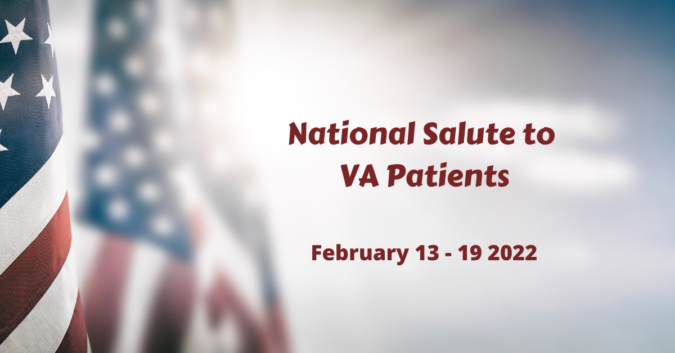Each year, during the week of February 14, the United States Department of Veterans Affairs (VA) holds its National Salute to Veteran Patients Program.
According to the VA, the National Salute aims to:
- Honor and express gratitude to U.S. veterans
- Increase public awareness about the role of the VA medical center
- Encourage non-military citizens to get more involved with the VA, by visiting hospitalized veterans or volunteering at one of your local VA facilities
Currently, there are more than 9 million U.S. veterans who are cared for by VA medical centers, outpatient clinics, domiciliaries, and nursing homes.
During National Salute to Veteran Patients Week, VA facilities around the country host events, including special ward visits, Valentine’s Day distributions, photo opportunities, and school-essay contests, among other activities.
Veteran Patients Need Support
The brave men and women in uniform who have answered the call to protect the United States and serve in the U.S. military have made innumerable sacrifices for the benefit of American citizens.
But defending American freedom and ideals comes with a cost — and the sacrifices soldiers make include both the mental and the physical. Upon returning to civilian life, U.S. veterans face extraordinary challenges. They face higher rates of mental illness and substance abuse than the general population, and many suffer physical problems stemming from their time in the military.
Common service-related physical health issues among U.S. veteran patients include:
- Chronic pain
- Traumatic brain injury
- Exposure to hazardous substances
Many of these injuries can become lifelong struggles, and a few can be deadly.
Asbestos exposure is one such example of how service-related health issues can arise among U.S. veterans. Asbestos was widely used throughout all branches of the military for more than half a century, particularly in the construction of U.S. Navy ships.
The inhalation or ingestion of airborne asbestos fibers can cause a range of respiratory diseases, including mesothelioma — a deadly form of cancer with no cure.
After decades of deception by the manufacturers of asbestos-containing products, the U.S. military began phasing out asbestos in the 1980s — after thousands of service members had already been exposed.
To this day, veterans are at a much higher risk of developing mesothelioma than ordinary civilians. In fact, nearly a third of all new mesothelioma diagnoses in the United States are among veterans and those who worked in the shipbuilding and repair industries.
U.S. Veteran Walter Twidwell’s Mesothelioma Diagnosis
When U.S. Navy veteran Walter Twidwell was diagnosed with mesothelioma, he was unaware of the link between his disease and his nearly two-decade career in the military. Walter’s service included long stints working as a boiler tender and fireman in the U.S. Navy. Between 1954-1973, he conducted maintenance and repairs in the engine and fire rooms of seven different vessels ported in New York, California, and Washington.
“The word ‘mesothelioma’ — I didn’t know anything about,” Walter said. During his time in the U.S. Navy, Walter was exposed to asbestos from his job duties involving asbestos-containing gaskets manufactured by Goodyear. In March 2017, doctors diagnosed him with mesothelioma after an X-ray revealed a mass in the pleural lining of his right lung.
Before his diagnosis, Walter lived an active life, building his log cabin home in Washington State by hand. After his diagnosis, Walter was physically unable to live his life as he had before.
Unfortunately, as much as Walter’s personal story is unique, the story of how he — a U.S. veteran — got mesothelioma isn’t.
Veterans like Walter suffer disproportionately from asbestos-related diseases such as mesothelioma, asbestos-related lung cancer, and asbestosis.
Saluting Veteran Patients This Week
Veterans deserve more than a simple salute — they deserve better access to healthcare, mobility services, mental-health services, job resources, skill-development programs, education, and more.
Veteran patients living with mesothelioma or another service-related illness may be able to seek VA benefits and resources through VA patient programs, including:
- VA Health Care
- VA Disability Compensation
- VA Special Monthly Compensation
- VA Pension
To learn more about the above resources and how to support veterans living with mesothelioma, visit our Health Care Resources for Veterans page, or contact us today.
For more than 45 years, Sokolove Law's VA-accredited asbestos lawyers have been fighting on behalf of veteran patients living with mesothelioma.
During National Salute to Veteran Patients week, think about how you can do your part to honor the brave soldiers who sacrificed their health and well-being to defend the United States. Be sure to always remember their sacrifices — and to take action to support their health.
This week, the VA invites individuals, veterans groups, civic organizations, businesses, schools, local media, celebrities, and sports stars to participate in the National Salute to Veteran Patients by contacting your nearest VA Medical Center and asking for Voluntary Service to learn more about the ways that you, your group or organization can work directly to support America’s heroes.
